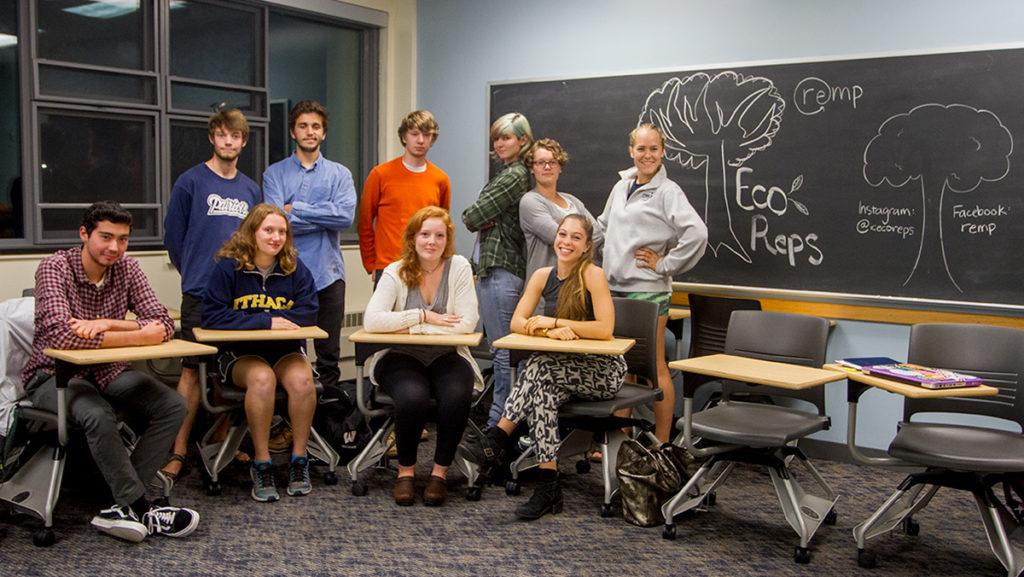Under a new student leader and the advisement of a department that has seen numerous staffing changes recently, 10 members of the Eco-Reps program at Ithaca College are now receiving pay again, following a yearlong gap due to budgetary changes.
Eco-Reps is a group under the umbrella of the Resource and Environmental Management Program at the college that promotes sustainable behaviors on campus for students, faculty and staff, and works to help the college reduce carbon emissions, according to its website. It also has six volunteer members who sit on nine of the 10 executive boards for Community Councils, the student-run governing bodies of the 10 residential hall clusters. The Eco-Reps work with Greg Lischke, the new director of sustainability and energy management in the Office of Facilities.
There are 10 paid Eco-Reps this year, called project managers, who work on specific sustainability issues on campus, said senior Joshua Enderle, the new program manager of Eco-Reps. Enderle became the program manager this year but said he has worked with the Office of Facilities since he was a freshman.
In addition to the 10 paid Eco-Reps and the six on Community Councils, the program also has 81 students who signed up at the Student Organization Fair to be volunteers for larger events, Enderle said.
In June 2015, the Eco-Reps’ interior structure changed from a 24-person, paid–position model to an entirely volunteer system, except for two paid positions, said Ben Tolles ’16, former sustainability project assistant of the Eco-Reps, last year.
But sophomore Janie Kleinberg, a paid Eco-Rep this year and a volunteer last year, said the group had problems with commitment from members last year.
“It’s really hard if we don’t have consistency among the members to actually implement change, especially at a policy level or campuswide,” Kleinberg said.
Student and administrative sources involved with sustainability on campus are unaware of why the Eco-Reps were not paid last year but attributed it to changes in the budget.
Tim Carey, associate vice president for facilities, said he did not know why the Eco-Reps were not paid last year as they were not yet under the facilities office. He said that after the group was moved, the department drafted the budget for the 2016–17 academic year to include the Eco-Reps in the payroll to bolster sustainability initiatives.
Lischke said that upon arriving at the college in June, he was given the budget and found room to pay the Eco-Reps again to improve the program.
The Eco-Reps are paid minimum wage, which is currently at $9 per hour in New York state. They were also paid minimum wage in previous years.
Lischke said paying Eco-Reps will help with productivity by giving members expectations.
“When you’re a volunteer, it doesn’t necessarily mean any less productivity, but when you’re receiving a paycheck, there’s certain expectations that are laid out pretty clearly,” said Lischke.
The paid Eco-Reps work in partnership on programs like Office Supply Collection and Reuse, where faculty and staff can bring unwanted office items to Phillips Hall for others to pick up and reuse; Take It Or Leave It, a program in which bins are placed in residence halls for students to leave unwanted items for other students to take around move-out time; and recycling and composting programs like the one at the Circle Apartments that was piloted last year, Kleinburg said.
She said the Eco-Reps work about five to seven hours a week, primarily spending their time doing research and taking action on their specific topics.
While the Eco-Reps are currently working under Lischke, they will transition to work under the sustainability programs coordinator — currently vacant following the retirement of the former coordinator Mark Darling, who worked at the college for 28 years — when that position is filled. Before Lischke, Jerone Gagliano was the director of sustainability and energy management but left after about six months in the position. Before that, Lew Durland served in the role for a year, but died May 21, 2015.
Enderle said he believes sustainability is making a rebound at the college.
“This is definitely the year … that we can start getting programs running and having sustainability here and having sustainability integrated on campus,” Enderle said.
This article has been corrected to reflect that Lischke arrived at the college in June 2016. He was hired in May of the same year, according to an announcement from the college.








